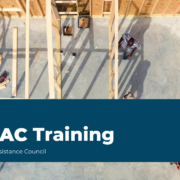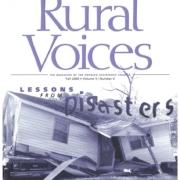HAC News Formats. pdf
August 31, 2017
Vol. 46, No. 18
Information available for Hurricane Harvey survivors • Congress faces busy September • HUD announces RAD expansion • HUD offers ROSS and Choice Neighborhoods funds • House and Senate committee reports disagree on ACS • Disaster preparedness toolkit released for homeless service providers • Nominations sought for HUD Secretary’s Opportunity and Empowerment Award • Need capital for your affordable housing project? • HAC offers September training on single-family development and 502 packaging
HAC News Formats. pdf
August 31, 2017
Vol. 46, No. 18
Information available for Hurricane Harvey survivors. A Harvey supplement to HAC’s disaster guide is free on HAC’s website. Resources are offered by federal agencies and programs including FEMA, HUD, USDA, and the LIHTC program.
Congress faces busy September. When Congress returns to work after Labor Day, legislators will need to deal with FY18 appropriations and much more. It still seems likely that FY18 will begin on October 1 with a continuing resolution holding funding at FY17 levels. In September the House will consider a single package comprised of eight of the FY18 appropriations bills, including those for USDA and HUD. House members have proposed numerous amendments, though it is not yet known which will be considered on the House floor. None of these amendments would impact USDA housing programs, some would increase funding for some HUD programs, and others would limit or block funding for some HUD programs. Senate leaders have not announced how they will approach the remaining appropriations work.
It is not clear whether Congress will be able to agree on changes to the Budget Control Act spending caps, as it has done in the past; if it does not, across-the-board cuts in FY18 funding are possible. A recent OMB report calculates that if the current spending limits remain unchanged, the House versions of the 12 annual appropriations bills would result in a sequestration of approximately $72.4 billion in defense programs. The Senate bills would result in a sequestration of approximately $2.0 billion in defense programs and $3.8 billion for non-defense programs.
Before Hurricane Harvey hit, President Trump threatened to allow the government to shut down if appropriations bills do not include funding for a U.S.-Mexico border wall. Responding to concerns that a shutdown would stop hurricane relief efforts as well, the President stated that the two things were “separate.”
In addition to appropriations, the federal debt limit must be raised by the end of September so the U.S. does not default on its debt payments. The debt ceiling itself does not affect spending levels or the federal deficit, but provisions that impact federal programs can be attached to the debt limit legislation. Tax reform, and possibly health care changes, remain under consideration as well, and the National Flood Insurance Program expires September 30. The NFIP’s renewal may be impacted by the Hurricane Harvey flooding; one possibility is a short-term renewal to gain more time for negotiating a longer-term solution.
HUD announces RAD expansion. HUD’s FY17 appropriations law increased the number of public housing units that can be converted to Section 8 vouchers through the Rental Assistance Demonstration. On August 23 HUD published a notice implementing the change. Instead of the previous 185,000 units, 225,000 can now take part in RAD. PHAs on HUD’s waiting list must apply by October 23 to participate. The eligibility and selection criteria will not change. For more information, email rad@hud.gov. The National Low Income Housing Coalition offers suggestions for ways public housing residents can prepare, and links to additional resources.
HUD offers ROSS and Choice Neighborhoods funds. Federally recognized tribes, PHAs, and nonprofits including resident associations can apply by October 23 for Resident Opportunity and Self-Sufficiency Program-Service Coordinators funding. For more information, contact ROSS-PIH@hud.gov. PHAs, local governments, and tribal entities are eligible for Choice Neighborhood Implementation Grants and must apply by November 22. For more information, contact ChoiceNeighborhoods@hud.gov.
House and Senate committee reports disagree on ACS. The House and Senate Appropriations Committees have both passed FY18 funding bills for the Commerce Department, which includes the Census Bureau. The Bureau conducts the American Community Survey, now the only source of some data previously collected in the decennial census, including housing and income information. The House report states, “The Committee is very concerned about the burdensome nature of the ACS and directs Census to focus on its core, constitutionally mandated decennial Census activities.” In contrast, the Senate report notes the importance of ACS data, particularly for “Americans who live in small towns and rural areas, as this survey often provides the only reliable and consistent source of information about these communities.” ACS appropriations are not separated from funds for other Census Bureau work, so neither bill provides a specific amount of funding for the survey.
Disaster preparedness toolkit released for homeless service providers. HUD, HHS, and the VA have published Disaster Preparedness to Promote Community Resilience: Information and Tools for Homeless Service Providers and Disaster Professionals. The document is written for emergency managers at all levels of government, homeless service providers, and health care providers. It is intended to provide preparedness strategies to better integrate homeless service providers into emergency management systems, ensure that homeless service providers are capable of providing essential services after disasters, and prepare health care providers to be able to address the health-related needs of homeless individuals.
Nominations sought for HUD Secretary’s Opportunity and Empowerment Award. Nominations are due September 8 of communities or plans, programs, or projects that directly result in an improved quality of life for low- and moderate-income residents. The award criteria emphasize how creative housing, economic development, and private investments are used in or with a comprehensive community development plan to build social equity and empower community residents. There is no nomination fee. For more information, contact the American Planning Association, awards@planning.org.
|
Need capital for your affordable housing project?
HAC’s loan funds provide low interest rate loans to support single- and multifamily affordable housing projects for low-income rural residents throughout the U.S. and territories. Capital is available for all types of affordable and mixed-income housing projects, including preservation, farmworker, senior, and veteran housing. HAC loan funds can be used for pre-development, site acquisition, site development, and construction/rehabilitation. Contact HAC’s loan fund staff at hacloanfund@ruralhome.org, 202-842-8600.
Please note: HAC is not able to offer loans to individuals or families. Borrowers must be nonprofit or for-profit organizations or government entities (including tribes).
|


